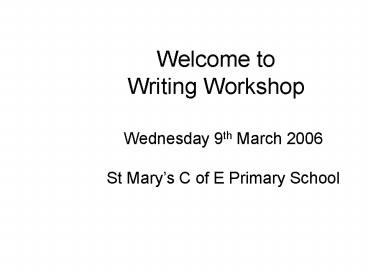Welcome to Writing Workshop - PowerPoint PPT Presentation
1 / 16
Title:
Welcome to Writing Workshop
Description:
To provide information on how to support children with their writing ... Lurking in the forest. Has been watching LLRH when she has been out walking. Event 1 ... – PowerPoint PPT presentation
Number of Views:76
Avg rating:3.0/5.0
Title: Welcome to Writing Workshop
1
Welcome to Writing Workshop
Wednesday 9th March 2006 St Marys C of E
Primary School
2
Objectives
- To provide information on how to support children
with their writing - To raise awareness of progression in all elements
of writing - To introduce parents to writing skeletons and
mind maps - To introduce 2 type, software to support typing
3
When we talk about writing what do we mean?
- Is it handwriting that we are talking about?
- Is it spelling?
- Is it style?
- Is it grammar?
- Is it punctuation?
- Are we talking about being able to write a story,
a note, an e-mail? - Activity 1- talk to the person next to you about
which aspects are the most - important.
- Make a list of the types writing
that you do each week.
4
Handwriting
- Mark making on paper pretend writing
- Shapes and symbols starting to appear that
resemble letters - Letters usually familiar, letters of name and
quite often capitals! - Well formed printed letters
- Formation of individual lower case letters, with
lead and tail - Fully joined up writing
Problems pencil grip, reversals b, d, p fine
motor control
5
Sentence structure
- Lots of letters in a long string
- Groups of letters with gaps between them
- Some words appearing - key words from reading
- Words grouped together in short phrases or
captions, e.g. the dog - Simple sentences being used e.g. The dog is big.
The dog likes sausages. - Compound sentences, e.g. The dog is big and likes
eating sausages. - Complex sentences, e.g. The dog, who likes eating
sausages, is enormous.
Activity 2 read the sentence and improve the
sentence structure.
6
(No Transcript)
7
Vocabulary Grammar
- Subject verb agreement
- Word order
- Tenses, past, present, future
- Passive voice
- Adverbs and adjectives
8
What shall I write?
Does it make sense?
Where do I start?
Do I need a comma
How do I spell it
9
Writing in school today
- We teach children to see writing as a means of
communicating to real people for a real reason.
We teach the skills of writing in different ways. - Text work, making sense of what we read
demonstrating and practising writing. - Sentence work punctuation, grammar, connecting
ideas. - Word work spelling, using words, hand writing
10
Lurking in the forest
Naughty girl
big and bad
Has been watching LLRH when she has been out
walking
Wears red cloak
The Wolf
Little Red Riding Hood
Lives in a house near the forest
Little Red Riding Hood
Told to stay to path
Event 1 LLRH has to take food to granny
Went off path to pick flowers
Bumped in to BBW
11
Mind maps and Writing Skeletons
Naughty girl
Lived in a little house close to the forest
Little Red Riding Hood
Always wears red cloak
Liked walking and picking flowers
12
Mind maps and Writing Skeletons
Lived in a little house close to the forest
Story
Naughty girl
Little Red Riding Hood
Liked walking and picking flowers
Always wears red cloak
Once upon a time there was a naughty little girl
called Little Red Riding Hood. She was called
this because she always wore a red cloak. Little
Red Riding Hood lived in a little house, close to
the forest. She loved walking and often stopped
to pick wild flowers.
13
Mind maps and Writing Skeletons
Non-fiction
Julius Caesar 55 BC
Claudius 43 AD
Queen of Iceni
Invasion
Tough warrior led rebellion
Boudicca
The Romans in Britain
settlement
departure
Each of the parts of this mind map would become
headings and sub headings in my piece of writing
14
How can you support your child at home?
- Give your child lots of opportunities to read
Good readers become good writers - Be a good role model, let your child see you and
others as writers, e.g. shopping lists, notes
etc. A family message board. - Try to provide a variety of equipment for writing
- Encourage your child to write for a variety of
real reasons
15
- What to do if they get stuck
- Take a break, do something different for a change
- Help them to create a mind map or skeleton plan
of their writing, - its ok to use pictures! - Use interview techniques and role play to help
clarify ideas, whether it is a character in a
story that they are developing or a process that
they are explaining in science. - Above all dont panic and dont do it for them!
16
- Handy Hints to Move Your Child on.
- Re-read writing and put in punctuation.
- Select ordinary words that they have written,
e.g. nice, good, sad and ask them to think of
some more powerful words. - Ask them what they think they could do to make
the story, explanation etc even better - Let them choose what they are going to write
about, a recount of a football match, birthday
outing etc































